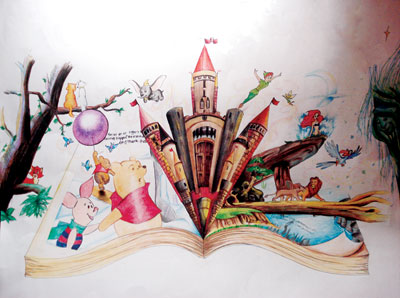All Nonfiction
- Bullying
- Books
- Academic
- Author Interviews
- Celebrity interviews
- College Articles
- College Essays
- Educator of the Year
- Heroes
- Interviews
- Memoir
- Personal Experience
- Sports
- Travel & Culture
All Opinions
- Bullying
- Current Events / Politics
- Discrimination
- Drugs / Alcohol / Smoking
- Entertainment / Celebrities
- Environment
- Love / Relationships
- Movies / Music / TV
- Pop Culture / Trends
- School / College
- Social Issues / Civics
- Spirituality / Religion
- Sports / Hobbies
All Hot Topics
- Bullying
- Community Service
- Environment
- Health
- Letters to the Editor
- Pride & Prejudice
- What Matters
- Back
Summer Guide
- Program Links
- Program Reviews
- Back
College Guide
- College Links
- College Reviews
- College Essays
- College Articles
- Back
Hide and Seek
“If you want your children to be intelligent, read them fairy tales. If you want them to be more intelligent, read them more fairy tales.”
-Albert Einstein
In her article, Why Everyone Should Read Fairy Tales, Writer Carolyn Fry punctuates the importance of these famed youthful stories and how they prove to be more than useful not just within the confines of childhood, but all throughout our adult lives.
With things like mythical creatures, far off places, magic spells, and true love, fairy tales are filled to the brim with ideas that completely dazzle our senses and enchant our thoughts, but it is for this reason that they are too often seen as far-fetched and not that of reality. What we fail to realize, however, are the concepts and values that embody these very elements which ultimately prove to be more than true. It may seem difficult to parallel our own lives and personal experiences to those of a princess locked away in a tower, but that is the difference between reading fairy tales as a child and reading them as an adult.
Children are in it mostly for the element of wonder, creativity, imagination, and just plain fun. But us grown ups, on the other hand, have a slightly more “critical” approach. We are in search of something, something bigger than ourselves. Yet, the answers we desire are not pressed within the pages of any textbook or scientific journal, but rather the works of pure fiction and make-believe. Fry encourages us to seek ourselves out, to close our eyes step into an old pair of shoes, ones that we have not filled for many years now, and just simply begin looking. But where do you even start? Well, there is that old book sitting across the room on your shelf...
Tracing your fingers along the front cover, a small grin creeps across your face. A flood of fond memories begins to inundate your mind as you course through time and venture back to the glory days of childhood. You expect to be swayed just as you would have been the first time you read it, as you were young and naive, not really knowing what to expect, but you are not the child you once were. Having dealt with life’s many marvels and mysteries a time or two, you have grown mindful and clever, but not wise, not yet.
As you trudge along each line of text, you search and scan for even the smallest fragment of a hint or clue, but unfortunately fall short, for it seems that no stones have been left unturned. What more is there to find?, you think, Why have you come back? Having drawn your patience, you resign from your journey and slowly begin to close the cover, making no effort to even insert a bookmark because you know that you will not be visiting again. Suddenly, however, a small crack in the surface of the page captures your eye at the last second, as if by fate.
You draw your gaze closer and closer until the picture on the other side becomes completely clear. The polished marble floor beneath your feet, the words “Happily Ever After” engraved upon it, begins to crumble. Instantly, you are engulfed by several new layers of the story that had been hiding in plain sight all this time, remaining completely unsurveyed until now. That princess in the tower is no longer a princess at all, but a mere reflection of yourself.
These characters and places and ideas are not just some party spectacle thrown together by fools and madmen with their heads stuck in the clouds to simply amuse the minds of children. They are mirrors, presented to the face of those who stare into them through the pages of books, mirrors “who reveal human behavior and beliefs while playing out their roles in a world of wonder and magic.”
For years, we have been told that these stories are meant to “[take] us away from the world as we know it, allowing an escape from the realities of our lives,” when the truth is, they are the realities of our lives. That is why they bear the name “fantasy”, fantastic reality. The plots within their pages are the same as those within our very own lives, as goes for any book we pull from the shelf. The only difference being is that you, yourself, is hiding inside one of them, or maybe several of them, just waiting to be discovered. It all depends on which ones you choose to read and which you do not.
“Who says paper worlds are an escape from what is real? As though the lives trapped in their binding are not ones that make you feel...”
-Erin Hanson

Similar Articles
JOIN THE DISCUSSION
This article has 0 comments.
